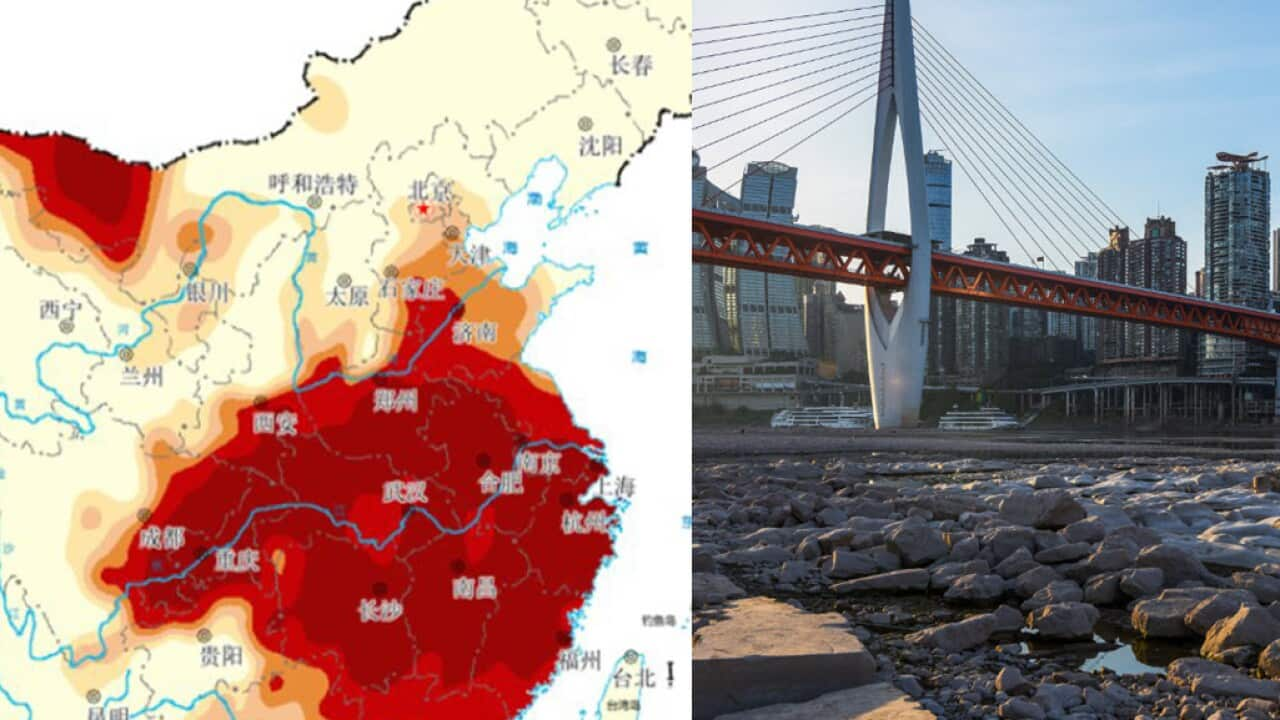China's more than two-month long heatwave has dried up as many as 66 rivers, including the critical Yangtze River, the world's third longest waterway.
For the 12th consecutive day, the country, particularly the southwestern region, has been under a heat "red alert".
It is the highest level of alert set by China's National Meteorological Center and indicates temperatures at and above 40 degrees Celsius.
The duration of the latest heatwave of 70 days breaks the previous record of 62 days set in 2013.
The Beijing Climate Centre said the latest heatwave is the country's "strongest" on record since data was first collected in 1961.
"The average intensity of heatwave events, impact scale, and duration taken into account, the combined intensity of regional heatwave event of China since 13 June has reached the strongest since the complete meteorological observation record existed, " a statement from the Centre said.
Half of China's land mass - about 4.5 million sq km - has been impacted by extreme heat.
A total of 914 national meteorological observatories have reached the standard for extreme heatwave events, with 216 stations documenting temperatures equal to or exceeding previous records.
Examining the data on surface air temperatures, Steven Pawson, chief of the Global Modeling and Assimilation Office at NASA'S Goddard Space Flight Center, said the .
"This large area of extreme (and record-breaking) heat is another clear indicator that emissions of greenhouse gases by human activity are causing weather extremes that impact our living conditions,” Mr Pawson said.
What is behind the heatwave and what are the implications?
Chen Lijuan, an expert at National Climate Center, singled out climate change as an influential factor driving the latest heatwave.
"Against the backdrop of global warming, heat waves will be a 'new normal'," he told reporters earlier this month.
Australian climate scientist Professor Lesley Hughes said the record-breaking heat in China should not come as a surprise.
"The word unprecedented is often used these days. We're seeing records broken now in China, but we've recently seen records broken in the UK with London getting to 40 degrees, and many parts of Europe in the last couple of months," she told SBS News.
"So we shouldn't be surprised by this because as average temperatures go up, we get more periods of this really extreme heat."
She said there is potential for conflict over competition for water supply as river systems located within a critical network of rivers in the Tibetan Plateau dry up.
"What we are seeing in the Himalayan and the Tibetan Plateau is a very rapid loss of ice volume in glaciers. Glaciers act like a frozen freshwater dam; and as they decline, so too does the supply of freshwater.
"And in fact, globally, it's thought that the retreat of glaciers can potentially threaten about one-sixth of the world's population in terms of their freshwater supply.
"The role of climate change in global conflict and global security is now a subject of intense speculation. Obviously, water is something that human communities simply cannot do without. Droughts often caused displacement of people moving away from dry areas.
"We've seen a lot of the conflict, for example, in the Darfur region in Sudan, really due to changes in water availability. So in the future, absolutely, yes, we will see global security increasingly threatened by these sorts of events."

Ten of Asia's major rivers are located in the Tibetan Plateau, which provides water to a fifth of the world's population - or more than 1.35 billion people. Credit: Climate Council of Australia
How is it impacting residents?
Since May, the world's most populous nation has been grappling with extreme weather events. Flooding and landslides killed dozens and displaced millions in southern China.
The latest heatwave has also resulted in drought and fire alerts being issued.
Last week, the country issued its first national drought alert of the year as regions continued to swelter the heatwave stretching from Sichuan in the southwest to Shanghai in the Yangtze delta.
In one of the Yangtze's important flood basins in central China's Jiangxi province, the country's largest freshwater lake, the Poyang Lake, has now shrunk to a quarter of its normal size for this time of year.

China's current heatwave has run for 70 days and is the country's longest on record, according to China's National Climate Center data stretching back to 1961. Source: AAP / STRINGER/EPA
China's Ministry of Emergency Management deployed 2,800 firefighters to Chongqing and Sichuan to deal with fire "red alert" issued on Tuesday.
Rainfall to those regions have been 80 per cent lower than in previous years.
In the last 10 days, 19 wildfires have been reported in Chongqing and Sichuan with no loss of life so far, according to financial news service Caixin.
Forest and grassland fire alerts are also in place for Jiangxi, Hunan and Guizhou.
Residents are also living with restrictions on power consumption as temperatures soar to 45C.
Chengdu's urban management authorities last week said energy conservation measures would include switching off outdoor lighting for advertisements, building name signs and in the general landscape.
LISTEN TO

Inaugural Electric Vehicle Summit gears up national plan
SBS News
19/08/202203:15
The choked supply of hydropower has hit Sichuan particularly hard.
Factories of major companies, including Japanese giant Toyota and Elon Musk's Tesla, have stopped using electricity for a week to allow the city of 80 million people to have more access to the power grid.
"Since July this year, the province has faced the most extreme high temperatures, the lowest rainfall in the corresponding period in history... (and) the highest power load in history," local authorities said.
Crops have also been impacted even as authorities move to put in place measures to minimise the damage.
China's emergency ministry calculated the direct economic losses from the high temperatures in July alone amounted to 2.73 billion yuan ($582 million), with 5.5 million people impacted.
With Reuters and AFP.










